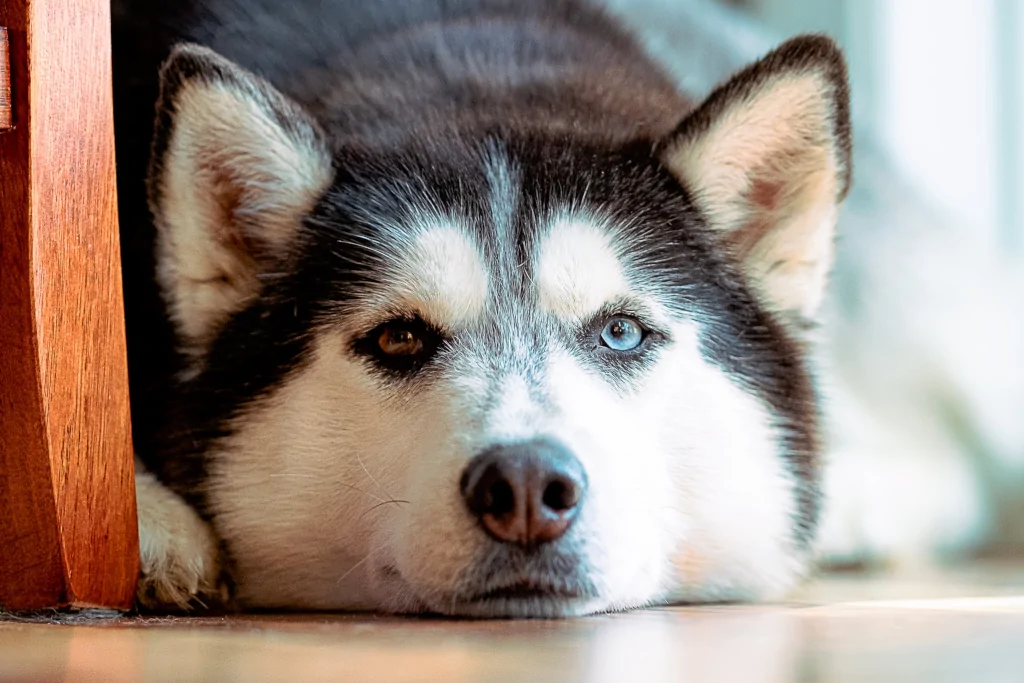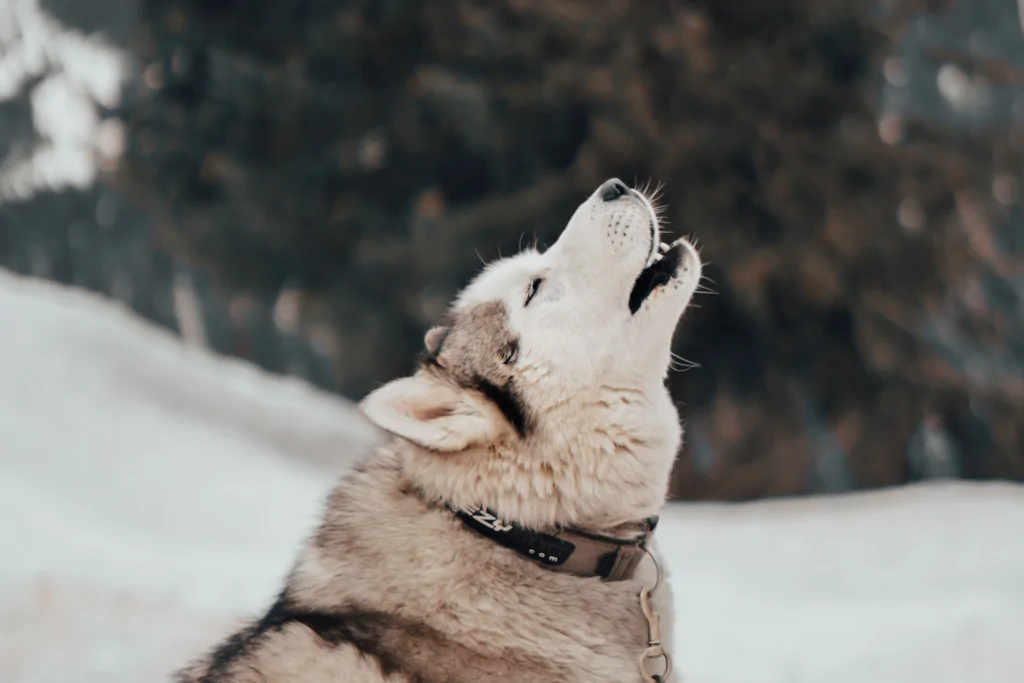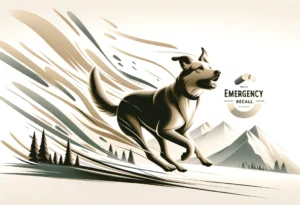You might be wondering why your dog doesn’t howl, especially when other dogs in the neighborhood let out their distinct vocalizations. Is something wrong, or is your dog simply a quiet type?
As a dog owner myself, I recall feeling concerned when my usually quiet dog suddenly let out a howl one night. I later learned he was responding to a distant siren, highlighting the intriguing complexities of our furry friends’ communication styles.
Diving deeper into the world of canine communication, we’ll explore the reasons behind varying howling behaviors, the meaning of different vocalizations, and even ways to encourage or discourage howling.

Why Do Some Dogs Howl and Others Don’t?
The reason some dogs howl while others don’t lies in their breed, personality, and individual temperament.
Dogs with a strong prey drive or a history of working alongside humans, such as hounds or hunting breeds, may be more prone to howling.
Howling is an innate form of communication used to alert pack members, locate others, or simply express excitement or distress. In contrast, more laid-back breeds or dogs with less vocal tendencies may not howl at all, which is perfectly normal.
Can All Dogs Learn to Howl?
Though some breeds are naturally more inclined to howl, almost all dogs have the capacity to learn howling.
It might not come as naturally to certain breeds, but with patience and proper training techniques, you can teach your dog to howl on command.
Keep in mind that every dog is unique, and it’s essential to consider your dog’s breed, background, and individual preferences when attempting to train them to howl.
Is It Okay if My Dog Doesn’t Howl?
Absolutely, it’s perfectly okay if your dog doesn’t howl. Just as some people are more talkative than others, dogs also have varying levels of vocalization.
Not every dog will express themselves in the same way, and howling is just one of many ways dogs communicate. If your dog is happy, healthy, and well-adjusted, the absence of howling should not be a cause for concern.
Let’s break down some reasons why you shouldn’t worry.
Individual Temperament
Every dog has its unique personality, and some are simply less vocal than others. If your dog is not howling, it could be because they are more introverted or prefer other forms of communication, such as barking, whining, or body language.
Just like I noticed with my own dog, who was more of a “silent observer” and rarely howled, it’s essential to recognize and respect your pet’s individual temperament.
Breed Differences
Some breeds are more likely to howl than others. For example, hounds and hunting dogs are known for their howling, while toy breeds or companion dogs may be less inclined to vocalize in this way.
If your dog’s breed is not typically associated with howling, there is no need to worry about their lack of this behavior.
Environmental Factors
Your dog’s environment plays a significant role in their behavior. A dog that isn’t exposed to stimuli that typically trigger howling, such as sirens or other howling dogs, may not have had a reason to develop this habit.
The absence of howling doesn’t necessarily indicate a problem with your dog. It could just be a result of their surroundings.
In summary, if your dog doesn’t howl, there’s usually no need to worry. As long as they are healthy, happy, and well-adjusted, their lack of howling is simply a reflection of their individuality.
Embrace your dog’s unique communication style and remember that, just like people, every dog is different.

The Meaning Behind Different Types of Dog Vocalizations
Dogs use a wide range of vocalizations to communicate their feelings, needs, and desires to us. Understanding the meaning behind these sounds can help you better connect with your furry friend and respond to their needs more effectively.
Some common dog vocalizations include barking, whining, growling, and of course, howling.
Barking is the most well-known form of dog communication and can convey various emotions like excitement, frustration, or even fear. One of my dogs would bark excitedly whenever I brought out her favorite toy, a worn-out tennis ball that squeaked when pressed.
Whining, on the other hand, can be a sign of anxiety or a request for attention, while growling typically indicates aggression or a warning.
Howling is a more primal form of communication, often linked to their wolf ancestors. It can serve various purposes, such as a long-distance form of communication, a response to certain sounds like sirens, or even an expression of separation anxiety.
Encouraging or Discouraging Howling in Your Dog
If you want to encourage howling in your dog, you can start by exposing them to stimuli that often trigger howling, like sirens, musical instruments, or even howling yourself.
You might be surprised by how quickly your dog picks up on it and starts to join in. I recall trying to sing along with my favorite song, hitting a high note (or at least attempting to), and my dog unexpectedly chimed in with a howl, making it a fun and memorable duet.
If you really want to make your dog howl, try this video:
On the other hand, if you want to discourage howling, it’s essential to determine the underlying reason for the behavior.
If it’s caused by boredom, consider providing more mental stimulation and exercise to keep your dog occupied. If your dog is howling due to separation anxiety, you might want to work on gradual desensitization to being alone or seek professional help from a dog trainer or behaviorist.
Remember to be patient and consistent when working on your dog’s vocal habits. Encouragement or discouragement should always be done in a positive and gentle manner, ensuring a strong and loving bond between you and your canine companion.
FAQs
Is it normal for my dog to howl only when I’m not home?
If your dog howls only when you’re not home, it could indicate separation anxiety or a response to certain environmental triggers like sirens or other dogs’ howling.
Do certain dog breeds howl more than others?
Some dog breeds, like Alaskan Malamutes, Siberian Huskies, and Beagles, are more prone to howling due to their ancestral connections to wolves and their vocal nature.
Can I teach my dog to howl on command?
You can teach your dog to howl on command using positive reinforcement, exposure to triggers, and patience during the training process. Similarly, you can train your dog to “speak” or to be “quiet”.
Is howling a sign of distress or unhappiness in dogs?
Howling can be a sign of distress or unhappiness in dogs, but it can also be a form of communication, response to specific sounds, or even an expression of excitement.
Alex, a passionate animal lover, has experience in training and understanding animal behavior. As a proud pet parent to two dogs and three cats, he founded AnimalReport.net to share insights from animal experts and expand his knowledge of the animal kingdom.




